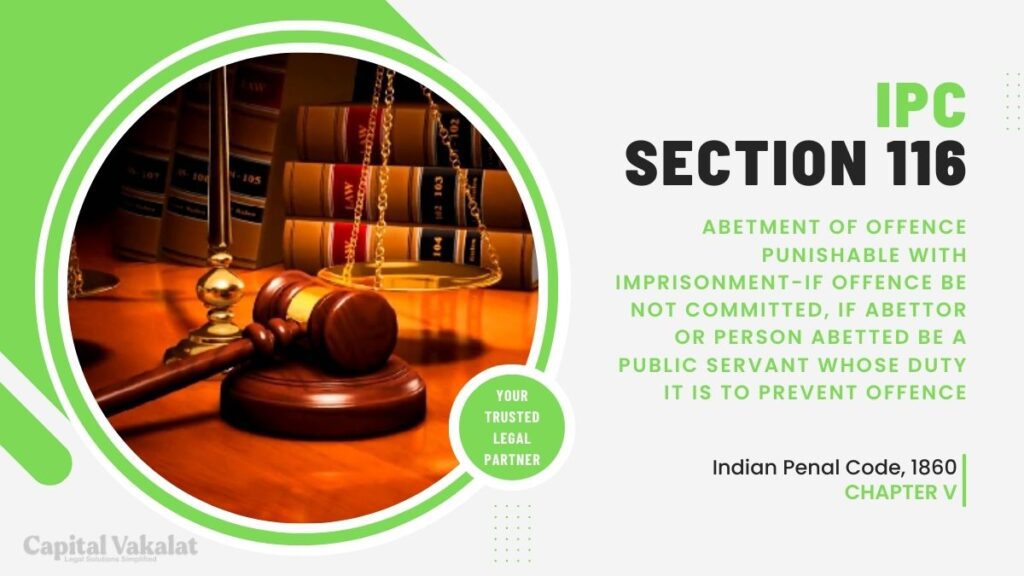Introduction to Section 116 IPC
Section 116 of the Indian Penal Code (IPC) deals with the concept of abetment in the context of offences that are punishable with imprisonment. It specifically focuses on situations where the offence is not committed, and the abettor or the person abetted is a public servant whose duty is to prevent the offence.

This legal provision plays a crucial role in the Indian criminal justice system and is essential for understanding the complexities of abetment laws.
Understanding Abetment
Before delving into the specifics of Section 116 IPC, it’s essential to comprehend what abetment means in the legal context. Abetment refers to the act of instigating, assisting, or encouraging another person to commit an offence. It is not limited to the actual commission of the crime but encompasses actions that contribute to the commission of the offence.
Offence Punishable with Imprisonment
In Section 116 IPC, the focus is on offences that are punishable with imprisonment. Such offences are considered serious in nature, and abetting them can have severe consequences. This section aims to deter individuals from engaging in activities that may lead to imprisonment for others.
Abettor and Person Abetted
Section 116 also distinguishes between the abettor and the person abetted. The abettor is the one who encourages or aids in the commission of the offence, while the person abetted is the one who is influenced or aided to commit the offence. Both roles are critical in understanding the dynamics of abetment.
The Role of Public Servants
An important aspect of Section 116 IPC is the involvement of public servants. If the person being abetted or the abettor is a public servant, and it is their duty to prevent the offence, the section comes into play. This highlights the significance of public servants in upholding the law and preventing crimes.
Duty to Prevent Offence
Public servants have a moral and legal obligation to prevent offences. Section 116 emphasizes that if a public servant neglects their duty and an offence does not occur due to their negligence, both the abettor and the public servant can be held accountable.
Elements of Section 116 IPC
To establish abetment under Section 116 IPC, certain elements must be met. These include the presence of an abettor, the person abetted, the abetment itself, and the duty of the public servant to prevent the offence.
Difference Between Offence Committed and Not Committed
One of the unique aspects of this section is that it covers situations where the offence is not actually committed. It’s essential to understand the legal distinctions between an offence committed and an offence prevented due to abetment.
Proving Abetment
Proving abetment can be a complex legal process. It involves presenting evidence of the abettor’s actions, the intent to abet, and the failure of the public servant to prevent the offence. This requires a thorough investigation and legal scrutiny.
Punishment for Abetment under Section 116 IPC
The punishment for abetment under Section 116 IPC varies depending on the specific circumstances of the case. It is essential to explore the range of penalties associated with abetment in such cases.
Case Studies
Real-life case studies provide insights into how Section 116 IPC has been applied in different scenarios. Analyzing these cases can help individuals better understand the practical implications of the law.
The Importance of Abetment Laws
Abetment laws, including Section 116 IPC, are crucial for maintaining law and order in society. They discourage individuals from aiding or encouraging criminal activities, thereby contributing to a safer and more just community.
Challenges in Prosecution
Prosecuting abetment cases can be challenging, as it requires a deep understanding of the law and thorough evidence. Overcoming these challenges is vital to ensuring that justice is served.
Conclusion
In conclusion, Section 116 IPC addresses the complex issue of abetment of offences punishable with imprisonment, especially when the offence is not committed due to the negligence of a public servant. This legal provision serves as a deterrent to those who may seek to abet criminal activities. It underscores the importance of public servants in preventing crimes and upholding the law.
FAQs
How does Section 116 IPC address the role of public servants?
Section 116 IPC emphasizes that if a public servant, whose duty is to prevent an offence, fails in their duty, both the abettor and the public servant can be held accountable.
What are the challenges in prosecuting abetment cases?
Prosecuting abetment cases can be challenging due to the need for comprehensive evidence and a deep understanding of the law.
Are there specific penalties outlined for abetment under Section 116 IPC?
The penalties for abetment under Section 116 IPC vary depending on the circumstances of the case. They can include imprisonment and fines.
How can abetment laws contribute to a safer society?
Abetment laws deter individuals from aiding or encouraging criminal activities, contributing to a safer and more just society.